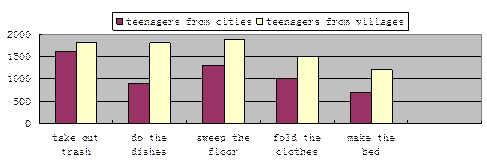
题目列表(包括答案和解析)
根据短文内容,判断正(T)误(F)。
Do you live in a city? Do you know how cities began? Long long ago, the world had only a few thousand people. These people moved from one place to another. They moved over the land, hunting animals for food.
No one knows how or when these people learned about growing food. But when they did, their life changed. They did not have to look for food any longer. They could stay in one place and grow it.
People began to live near one another, so the first village was established (建立). Many people came to live in the villages, and these villages became even larger.
When machines appeared, life in the villages changed again. People built factories. More and more people lived near the factories. The cities began.
Today, it’s strange that some people are moving back to small villages. Can you tell me why?
1.People moved from place to place to hunt animals.
2.The story says,“No one knows how or when these people learned about growing food. But when they did, their life changed.” In this sentence, the word “they” means people.
3.When machines appeared, life in the villages changed again.
4.All people like to live only in big cities.
5.People built factories after the cities grew big.
| Welcome to the White House Hotel Special(特价): now get 3 nights at the price of 21! Enjoy the beautiful English countryside when you stay with us ---we are in an 18th century(世纪) house in the middle of pretty green hills and gardens --- near many of the famous places to see in the Lake District. Go for a boat ride, or walk along the country roads. Try traditional English afternoon tea in the villages nearby. Prices: May—June :$ 40 every person, every night. July—August: $50 every person, every night. (All prices are bed + breakfast) |
| A.a newspaper | B.a notebook | C.a story book | D.a dictionary |
| A.$150 | B.$200 | C.$250 | D.$400 |
| A.bed and breakfast | B.bed and dinner |
| C.bed and a boat ride | D.breakfast and a boat ride |

In Europe many people died during the Second World War. As a result, at the end of the war there were many orphans(孤儿)there. A man called Hermann Gmeiner wanted to help these children. His idea was simple. He wanted orphans to have a home, and he wanted them to have the care and kindness of parents. Gmeiner asked people to give him some money. With this money he built the first SOS Children’s Village at Imst, in Austria. It opened in1949. This is how the SOS stand for “Save Our Souls(灵魂).” This means “Please help us!” An SOS Children’ village gives help to orphans.
Hermann Gmeiner’s idea for helping orphans soon spread(传播)all over the world. By 1983 there were 170 SOS Children’s Villages in the world. People in many countries give money to help the villages. Today the children from the first village have grown up. Now some of them work in other SOS Children’s Villages.
In SOS Villages orphans live in family groups. There are several houses in each village. The biggest village has 40 or 50 houses! Between seven and ten children live in a house. A woman lives with each group of children and looks after them. She gives the children a lot of love and kindness. She cooks meals for them and makes comfortable, happy home for them.
Of course, the children don’t spend all their time in the village. They go to school, they go out with their friends. But the village gives them a home—sometimes for the first time in their lives.
【小题1】Which of the following came last?
| A.People gave Gmeiner some money. |
| B.There were many orphans at the end of the war |
| C.Gmeiner built the first SOS Children’s Village |
| D.A man called Hermann Gmeiner wanted to help the orphans |
| A.who has no brother | B.who has no sister | C.who has no parents | D.all of the above |
| A.governments | B.special organization |
| C.the orphans themselves | D.people in general(大体上) |
| A.She gives the children a lot of love and kindness | B.She lives with each group of children |
| C.She cooks meals for children | D.She looks after them |
Do you live in a city? Do you know how cities began? Long long ago, the world had only a few thousand people. These people moved from one place to another. They moved over the land, hunting animals for food.
No one knows how or when these people learned about growing food. But when they did, their lives changed. They did not have to look for food any longer. They could stay in one place and grow it. People began to live near one another, so the first village was established. Many people came to work in the villages, and these villages became even larger.
When machines appeared, life in the villages changed again. People built factories. More and more people lived near the factories. The cities began.
Today, it’s strange that some people are moving back to small villages. Can you tell me why?
根据短文内容,判断正(T)误(F)。
1.People moved from place to place to hunt animals.
2.The story says,“No one knows how or when these people learned about growing food. But when they did, their lives changed.” In this sentence, the word “they” means people.
3. When machines appeared, life in the cities changed again.
4. All people like to live only in very big cities.
5. People built factories after the cities grew big.
湖北省互联网违法和不良信息举报平台 | 网上有害信息举报专区 | 电信诈骗举报专区 | 涉历史虚无主义有害信息举报专区 | 涉企侵权举报专区
违法和不良信息举报电话:027-86699610 举报邮箱:58377363@163.com